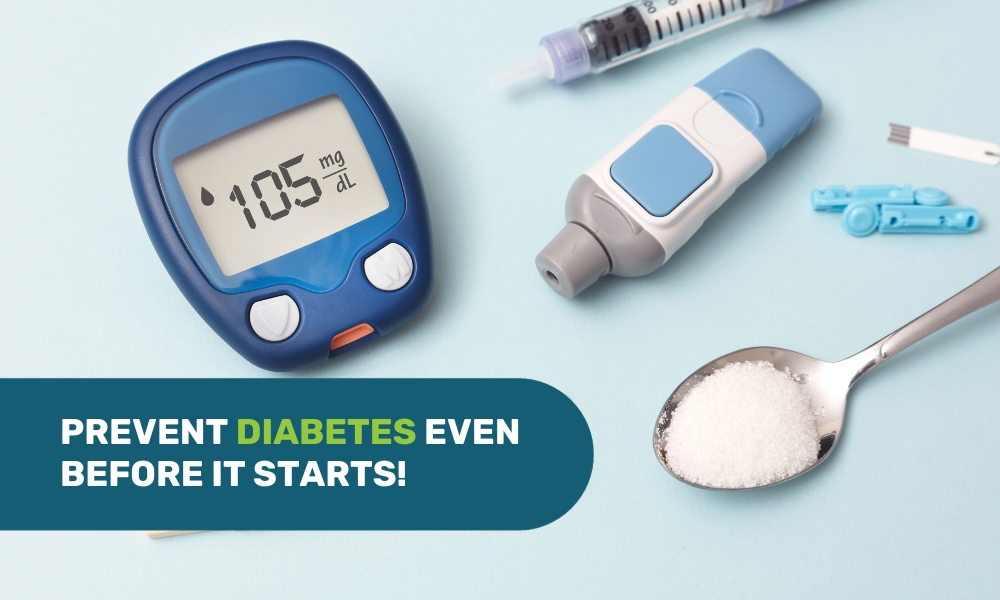Though having prediabetes does not mean that one may develop diabetes for sure; it is an alarming sign to start taking action to prevent the condition at a primary level. Changing diet and lifestyle habits can make a big difference.
What is Prediabetes?
Prediabetes is the period before diabetes is diagnosed, a condition where our blood sugar is higher than normal but not high enough to be diagnosed as type 2 diabetes. Prediabetes is associated with insulin resistance, when our cells stop responding to the hormone insulin.
The pancreas gland produces insulin, which allows glucose to enter our cells. When our body does not use insulin properly, the glucose accumulates in our bloodstream.
Prediabetes does not always cause symptoms, but some people may develop darkening of the skin around the neck, armpits, and elbows.
A simple blood test like fasting plasma glucose (FPG) determines prediabetes. Results between 100 and 125 indicate prediabetes.
A doctor may also use an A1C test, which monitors the blood sugar over three months. Test results between 5.7 and 6.4 percent indicate prediabetes.
A prediabetes diagnosis, however, does not mean that one will develop type 2 diabetes. Fortunately, progressing from prediabetes to diabetes is not impossible. Some people successfully manage their prediabetes by modifying their lifestyle and diet.
Ways to Prevent diabetes before it starts
Cut refined carbohydrates and sugar from the diet. Eating foods with high amount of refined carbohydrates and sugar spikes our insulin and blood sugar levels, which may trigger the development of diabetes over time. Examples of refined carbohydrates include potatoes, white bread, and many breakfast cereals. Instead, one must limit sugar and choose complex carbohydrates such as oatmeal, vegetables, and whole grains.
-
Plenty of fiber. One must consume plenty of fiber, as it benefits gut health and weight management. Consuming a good fiber portion at each meal can help prevent spikes in insulin and blood sugar levels, which may help reduce the risk of developing diabetes.
-
Portions size matters. Avoiding large portion sizes can help reduce insulin and blood sugar levels significantly. Rather, eating smaller portions can help decrease the risk of diabetes. Eating too much food at one time causes higher blood sugar and higher insulin levels in people with higher risk of diabetes.
-
Drink enough water. Drinking water instead of other beverages may help control insulin and blood sugar levels, thereby reducing the risk of diabetes. Drinking water most of the time helps to stay hydrated and aids in avoiding beverages that are high in preservatives, sugar, and other unnecessary ingredients.
-
Quit smoking. The risk of developing diabetes in individuals who consume tobacco and are prediabetics is substantially high. Smoking contributes to insulin resistance, which can cause type 2 diabetes. Quitting reduces this risk of type 2 diabetes over time.
-
Aim for 30 minutes workout. One must try to be intentionally active in whatever one does. It may be by walking, dancing, lifting weights, or swimming for 30 minutes five days per week. If one is not physically active and sitting the entire day, then this may lead to an increased risk of diabetes. So, get moving and get active.
-
Work with a dietitian nutritionist: Knowing what to eat with prediabetes can be tricky. In prediabetes, it is recommended to consult a professional dietitian or nutritionist who can provide nutritional guidance and advice on what to eat and avoid. They can help develop a meal plan specific to an individual’s condition and offer other practical strategies to maintain a healthy diet.
The bottom line
A prediabetes diagnosis does not mean that one may progress to type 2 diabetes. But one needs to understand that this is the right time to make good and healthy choices so that the blood sugar is managed and brought to a healthy range. With type 2 diabetes come multiple complications like stroke, heart disease, nerve damage, and others. It is, therefore, essential to manage blood sugar levels at the preliminary stage itself. For managing prediabetes, CLICK HERE.





